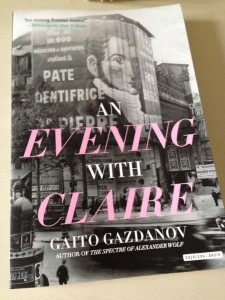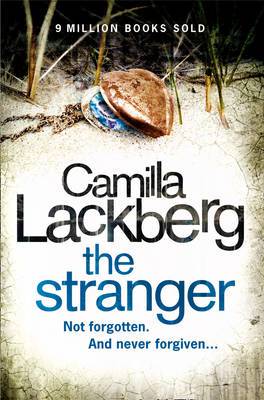Back in 2013, I was captivated by Gaito Gazdanov’s The Spectre of Alexander Wolf (1947), an existential novel that explored questions of coincidence, fate, love and death. I read it pre-blog, but it’s been widely reviewed elsewhere. Originally published in 1930, An Evening with Claire was Gazdanov’s first novel, written during his time as a Russian émigré in Paris. It was an instant success, resonating strongly with the displaced population across Europe as a whole. In writing this novel, Gazdanov drew heavily on his own life via a series of memories covering his childhood, his time in the Russian Civil War and his impressions of an enigmatic young woman named Claire, the figure captured in the book’s title.

As the novel opens, the narrator – a young man named Sosedov, but referred to as Kolya throughout – has recently reconnected with Claire, a French woman he first met some ten years earlier in 1917. Kolya has been spending his evenings with Claire at her home in Paris, the lady’s husband being away on an extended trip to Ceylon. While Claire sleeps, Kolya reflects on the time he has spent desiring her over the years, the woman who has occupied his mind for the past decade.
Surrendering to the power of sleep, or sadness, or yet another emotion, no matter how strong the emotion was she never ceased being herself; and it seemed that the mightiest tremors were powerless to alert this perfectly completed body, could never destroy this final invincible charm which had induced me to waste ten years of my life in pursuit of Claire, and which had made it impossible for me to get her out of my mind at any time, any place. (p. 28)
This process triggers a series of memories for Kolya as he gradually comes to remember everything that has happened in his life, particularly the events of his first eighteen years. While the difficulty of understanding and articulating everything seems immense, Kolya proceeds to explore his childhood and adolescence through a stream of associations, moving seamlessly from one recollection to another over the course of the novel. We hear of the young boy’s close relationship with his father, a man obsessed with fires and hunting, a man whom Kolya loved very dearly at the time. By contrast, Kolya’s mother is portrayed as a relatively cold and controlled woman, someone who showed little warmth and affection in her dealings with the children. Nevertheless, Kolya respected her a great deal.
From a relatively early age, Kolya’s life was marked by the shadow of death. He was just eight years old when his father died, and by the time of the Great War both of his sisters had followed suit.
Death was never far away, and the abyss into which my imagination plunged me seemed to belong to it. I think this feeling was hereditary: It was not for nothing that my father so violently detested everything that reminded him of the inevitable end; this fearless man felt his weakness here. It was as though my mother’s unconscious, cold indifference reflected someone’s final stillness, and the ravenous memories which my sisters possessed absorbed everything into themselves so quickly because, somewhere in their distant foreboding, death already existed. (p. 60)
As a consequence, Kolya was left alone with his mother, a woman who struggled to come to terms with the losses that had touched her family.
At various times during his childhood, Kolya felt as though he was turning in on himself, a process which left him somewhat immune to the external events that were happening around him. This feeling emerged once again when Kolya was sent to military school, a place he disliked a great deal. Given that the other cadets seemed so different, Kolya kept his distance from the rest of the pack, a move that also caused him to develop an instinct for self-preservation when dealing with his tutors.
The novel touches on various stories and anecdotes from Kolya’s time at both the military school and the gymnasium that followed, too many to capture here. While several of these memories are melancholy in tone, there are recollections of happier times as well: the summers Kolya spent at his grandfather’s house in Caucasus where many of his father’s relatives also lived; memories of Claire too, especially Kolya’s first encounter with her at the tennis courts of the gymnastics society (Kolya was around fourteen at the time). From the moment he first set eyes on eighteen-year-old Claire, Kolya was captivated by her presence. A native of Paris, Claire had travelled to Russia with her family; her father, a merchant, had a base in Ukraine which he visited every now and again. Kolya and the coquettish Claire spent much of the summer together, laughing and joking at Claire’s house. Even so, Kolya was acutely aware of Claire’s blossoming sexuality, something he did not fully understand at the time despite being able to feel it. By late autumn that year, Claire had all but disappeared from Kolya’s life, a development which left the young boy feeling rather bereft.
The final third of the novel focuses on the time Kolya spent with the White Army in the Russian Civil War, a somewhat arbitrary move motivated by the desire to know what war was like, to experience the new and unknown. (Kolya readily admits that his decision was not driven by any political beliefs or ideals; he could have just as easily joined the Reds had they been in possession of his part of the country at the time.) The memories of his departure for the front at the age of sixteen are imbued with a tender sense of melancholy, a tone which is so characteristic of this haunting novel.
It was late autumn, and in the cold air I could feel the sorrow and the regret characteristic of every departure. I was never able to accustom myself to this feeling; for me, every departure marked the beginning of a new existence and consequently, the necessity of living once again by groping, of finding once more among the people and things surrounding me, a more or less intimate environment in which to recapture my former tranquillity, so needed to make space for those inner oscillations and shocks with which I was so greatly preoccupied. (p. 105)
Kolya’s time in the war gave him a deep insight into the psychology of human behaviour; while stationed at the front he witnessed several instances of bravery, cowardice and fear. This section is packed with stories, anecdotes and memories of Kolya’s comrades, including tales of some of the scoundrels he encountered during this period. By the summer of 1920, Kolya had made his way to Sevastopol where he witnessed some of the emotional fallout from the war. The atmosphere in this desperate city seemed to reflect all the eternal sorrow and melancholy of provincial Russia, a feeling that is captured in this next passage.
I saw tears in the eyes of usually unsentimental people. Having deprived them of their homes, families and dinner parties, the Revolution had suddenly given them the ability to feel deep regret, and for an instant liberated from their coarse, warlike casing their long-forgotten, long-lost emotional sensitivity. It was as if these people were taking part in a minor-keyed symphony of the theater hall; they saw for the first time that there was a biography and a history to their lives, and a lost happiness which they had only read about in books, (p. 133)
An Evening with Claire is a deeply introspective novel, one that offers a rare insight into a vanished world. Kolya’s memories are shot through with a gentle sense of sadness and regret coupled with a noticeable yearning for Claire. Perhaps this reunion in Paris represents a new beginning for Kolya, an element of hope for the future? I’d like to think so.
Guy and Karen have also reviewed this book – just click on the links to read their reviews.
An Evening with Claire is published by Overlook Duckworth / Ardis; personal copy.
Share this:




